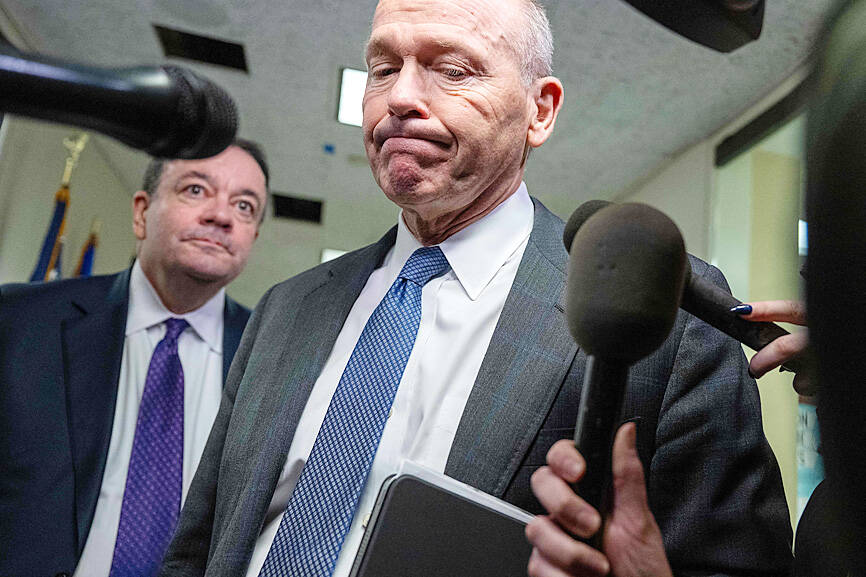Boeing Co CEO Dave Calhoun will step down by the end of the year, in a broad management shakeup brought on by the planemaker’s sprawling safety crisis stemming from a January mid-air panel blowout on a 737 MAX plane.
Boeing Commercial Airplanes president and CEO Stan Deal would retire, and Stephanie Pope would lead that business, the planemaker said yesterday. Steve Mollenkopf has been appointed the new chair of the board.
The leadership change caps weeks of turmoil at Boeing, after the mid-air incident involving an Alaska Airlines-operated MAX 9 jet carrying 171 passengers turned into a full-blown safety and reputational crisis for the iconic planemaker.

Photo: AFP
Boeing shares have lost roughly one-quarter of their value since the incident. They were up 4 percent in premarket trading.
The company is facing heavy regulatory scrutiny and US authorities curbed production while it attempts to fix safety and quality issues. The company is in talks to buy its former subsidiary Spirit AeroSystems Holdings Inc to try to get more control over its supply chain.
Some investors expressed concern that this shake-up would not be enough to address long-standing safety issues that were the reason for Calhoun’s ascendance to CEO in the first place in 2020.
"We’ve long thought that the issues at Boeing have been seated in cultural challenges," Newedge Wealth LLC chief investment officer Cameron Dawson said.
Last week, a group of US airline CEOs sought meetings with Boeing directors without Calhoun to express concern over the Alaska Airlines Flight 1282 accident, saying it was an unusual sign of frustration with the manufacturer’s problems and Calhoun.
Calhoun, an industrial veteran who has held top positions at several troubled companies, became CEO in January 2020 with the mandate of steering the planemaker through a series of crises emanating from two MAX crashes in 2018 and 2019 that killed nearly 350 people.
Following the incident, the US Federal Aviation Administration (FAA) curbed Boeing production to a rate of 38 jets per month, but company chief financial officer Brian West said last week it had not even reached that figure.
Since Calhoun took the reins, the company has endured ongoing delays in production. Still, in October last year, Calhoun was upbeat over how fast Boeing could raise output of its MAX jets, saying Boeing would get back to 38 jets a month and was "anxious to build from there as fast as we can."
But weeks after the mid-air cabin panel blowout in January, Calhoun said it’s time to "go slow to go fast."
The company’s crisis has frustrated airlines already struggling with delivery delays from both Boeing and its rival Airbus SE, and the planemaker has been burning more cash than expected this quarter.
"For years, we prioritized the movement of the airplane through the factory over getting it done right, and that’s got to change," West said last week.
Airbus recently clinched orders for 65 jets from two of Boeing’s key Asian customers — Japan Airlines Co and Korean Air Lines Co, in what some saw as a sign of executives’ concerns about Boeing.

MULTIFACETED: A task force has analyzed possible scenarios and created responses to assist domestic industries in dealing with US tariffs, the economics minister said The Executive Yuan is tomorrow to announce countermeasures to US President Donald Trump’s planned reciprocal tariffs, although the details of the plan would not be made public until Monday next week, Minister of Economic Affairs J.W. Kuo (郭智輝) said yesterday. The Cabinet established an economic and trade task force in November last year to deal with US trade and tariff related issues, Kuo told reporters outside the legislature in Taipei. The task force has been analyzing and evaluating all kinds of scenarios to identify suitable responses and determine how best to assist domestic industries in managing the effects of Trump’s tariffs, he

TIGHT-LIPPED: UMC said it had no merger plans at the moment, after Nikkei Asia reported that the firm and GlobalFoundries were considering restarting merger talks United Microelectronics Corp (UMC, 聯電), the world’s No. 4 contract chipmaker, yesterday launched a new US$5 billion 12-inch chip factory in Singapore as part of its latest effort to diversify its manufacturing footprint amid growing geopolitical risks. The new factory, adjacent to UMC’s existing Singapore fab in the Pasir Res Wafer Fab Park, is scheduled to enter volume production next year, utilizing mature 22-nanometer and 28-nanometer process technologies, UMC said in a statement. The company plans to invest US$5 billion during the first phase of the new fab, which would have an installed capacity of 30,000 12-inch wafers per month, it said. The

Taiwan’s official purchasing managers’ index (PMI) last month rose 0.2 percentage points to 54.2, in a second consecutive month of expansion, thanks to front-loading demand intended to avoid potential US tariff hikes, the Chung-Hua Institution for Economic Research (CIER, 中華經濟研究院) said yesterday. While short-term demand appeared robust, uncertainties rose due to US President Donald Trump’s unpredictable trade policy, CIER president Lien Hsien-ming (連賢明) told a news conference in Taipei. Taiwan’s economy this year would be characterized by high-level fluctuations and the volatility would be wilder than most expect, Lien said Demand for electronics, particularly semiconductors, continues to benefit from US technology giants’ effort

‘SWASTICAR’: Tesla CEO Elon Musk’s close association with Donald Trump has prompted opponents to brand him a ‘Nazi’ and resulted in a dramatic drop in sales Demonstrators descended on Tesla Inc dealerships across the US, and in Europe and Canada on Saturday to protest company chief Elon Musk, who has amassed extraordinary power as a top adviser to US President Donald Trump. Waving signs with messages such as “Musk is stealing our money” and “Reclaim our country,” the protests largely took place peacefully following fiery episodes of vandalism on Tesla vehicles, dealerships and other facilities in recent weeks that US officials have denounced as terrorism. Hundreds rallied on Saturday outside the Tesla dealership in Manhattan. Some blasted Musk, the world’s richest man, while others demanded the shuttering of his